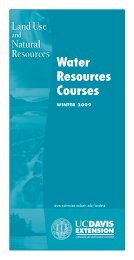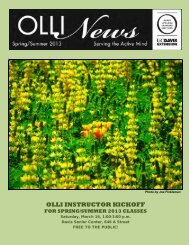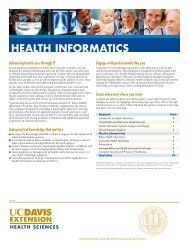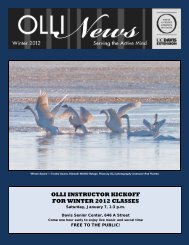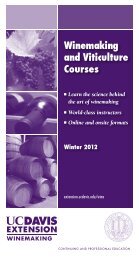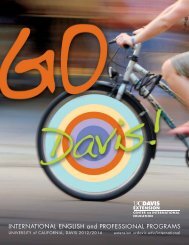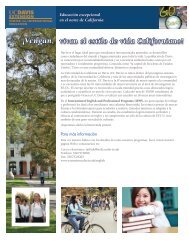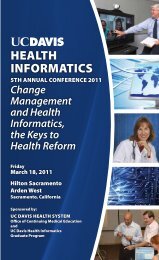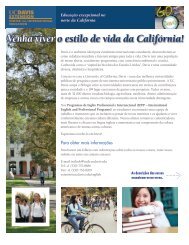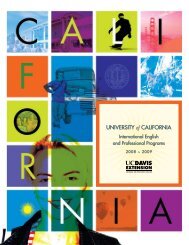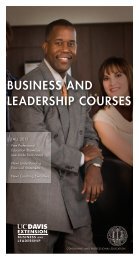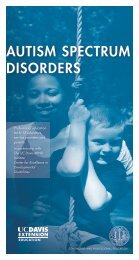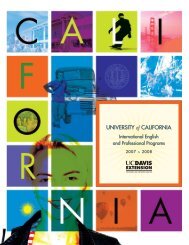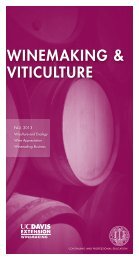Winemaking & Viticulture - UC Davis Extension
Winemaking & Viticulture - UC Davis Extension
Winemaking & Viticulture - UC Davis Extension
- No tags were found...
Create successful ePaper yourself
Turn your PDF publications into a flip-book with our unique Google optimized e-Paper software.
OnlineIntroduction to Wineand <strong>Winemaking</strong>3 quarter units academic credit, X402.26.Whether you’re interested in a career inthe wine industry or are just a devotedenophile, you can take this unique <strong>UC</strong><strong>Davis</strong> <strong>Extension</strong> course at home, at yourconvenience. Learn about topics such aswine and winegrowing areas around theworld, fundamentals of the winemakingprocess, wine and health issues, how to interpreta wine label, basic wine tasting andthe history of wine. Lectures are providedby faculty in the <strong>UC</strong> <strong>Davis</strong> Department of<strong>Viticulture</strong> and Enology.This is the first course in the <strong>Winemaking</strong>Certificate Program. It can be taken as anindividual course or as part of the certificateprogram. If you are interested in thecertificate program, you must complete anapplication in addition to enrolling for thiscourse. The application may be found onour website.extension.ucdavis.edu/winemakingcertThis course must be successfully completedwith a grade of “C” or better in order tocontinue to course two, Wine Production, inthe certificate program.How you will benefit■■Learn in an interactive, web-basededucational environment■■Access top-quality, college-level coursematerial from anywhere in the world■■Gain exposure to an internationallyrecognized program and instructorsWho should enrollIndividuals working in the wine industryand affiliated networks, entry-level wineryemployees, wine marketing and hospitalityworkers, distributors, restaurateurs, wineenthusiasts and anyone wanting to explorea career in viticulture and enology.Refund policyRefunds for this course must be requestedwithin two weeks of the start date. Therefund processing fee is $65.HILDEGARDE HEYMANN, Ph.D., is aprofessor in the Department of <strong>Viticulture</strong>and Enology, <strong>UC</strong> <strong>Davis</strong>.■■Enroll now through March 29 andcomplete by June 15. Passwords issuedstarting April 2.■■Technical requirements: This courserequires that you have a current emailaccount and a stable connection to theInternet. You also need to have the abilityto view PDF documents and Flash-basedpresentations, and speakers or headphonesto hear audio presentation.■ ■ $685. Enroll in section 114VID251.
<strong>Viticulture</strong> & EnologyManaging the SmallVineyard IINoncredit.The Small Vineyard Series is a quarterlyseries of one-day classes designed for homeand small commercial winegrowers. Classescover both basic principles of viticultureand practical aspects of small vineyardmanagement and may be taken in anyorder. Presentations are designed for growerswith little or no previous experience ingrape growing. This is the second of twoclasses focusing on vineyard managementpractices. It covers many of the vineyardmanagement activities occurring in thespring and summer months, includingcanopy management principles and practices,grapevine nutrition and fertilization,and vineyard irrigation. Discussions onfruit ripening, sampling procedures andharvest criteria are also included.DONNA HIRSCHFELT, M.S., is a retiredviticulture adviser. For 20 years she wasa viticulture adviser for <strong>UC</strong> Cooperative<strong>Extension</strong> working in the Central Valleyand the Sierra foothills.RHONDA J. SMITH is the <strong>UC</strong> Cooperative<strong>Extension</strong> viticulture farm adviser forSonoma County. Her research and <strong>UC</strong>Cooperative <strong>Extension</strong> program includesevaluations of rootstocks and clones onyield components and fruit composition,pest management and vineyard irrigation.■■1 meeting.■■May 12: Sat., 9 a.m.–4 p.m.■■<strong>UC</strong> <strong>Davis</strong>: Room 180, Medical ScienceBuilding, E. Health Science Dr.■ ■ $175. Includes lunch and course material.Enroll in section 114VIT204.Successful Home<strong>Winemaking</strong>Noncredit.Receive an overview of all phases of homewine production in this course designed forbeginning home winemakers with little orno experience. Focus on a review of fermentationtheory, yeasts and starter cultures,white and red wine production, commonproblems, sanitation and cleaning agents,and equipment suitable for small-scale wineproduction. This is an excellent overviewfor anyone considering making wine for thefirst time this season.THOMAS COLLINS is the senior managerof fermentation research at Foster’s WineEstates where he oversees the developmentand implementation of a broad range ofwinemaking research projects. He has beenwith Foster’s for four years conductingpilot scale wine fermentations and hasextensive home winemaking experience.Prior to joining Foster’s, he was the EastCoast manager of grower relations andvineyard operations for Canandaigua WineCompany.■■1 meeting.■■April 21: Sat., 8:30 a.m.–3:30 p.m.■■<strong>Davis</strong>: Da Vinci Building,1632 Da Vinci Ct.■ ■ $140. Includes course material. Pleasebring a sack lunch. Enroll in section114VIT203.Contact usfacebook.com/ucdewineStay Connectedextension.ucdavis.edu/email
Introduction to WineAnalysisNoncredit.Examine the basics of wine analysis forcommercial and advanced home wineproduction. Designed for serious winemakers,winery lab employees and smallcommercial winemakers, this one-day classcombines short lecture and hands-on experience.Gain practice with, and examinethe limitations of, each analysis. Work insmall groups, with university wines, togain familiarity with these common labanalyses: free and total SO 2by Ripper andAeration-Oxidation, volatile acidity distillation,titratable acidity, pH, malolactic paperchromatography, residual sugar by pill testand percentage of alcohol by ebulliometer.Some aspects of wine chemistry will bereviewed as it pertains to each analysis.For optimal understanding of the resultsof each analysis, it is highly recommendedthat participants have previously attendedIntroduction to Wine Chemistry.Due to restricted lab space, the class islimited to 24 students and early enrollmentis encouraged. Please bring a calculator,notebook, old clothes or lab coat, andclosed-toed, comfortable shoes (no sandalsor crocs, please). Be advised that ourteaching labs observe OSHA rules. Thereis no eating or drinking of any liquids(including water) allowed in the labs. It isrecommended that you bring a bag lunchdue to the facility location and limited foodservice on campus.MICHAEL S. RAMSEY is the teachinglaboratory manager for the Department of<strong>Viticulture</strong> and Enology, <strong>UC</strong> <strong>Davis</strong>, wherehe is responsible for assisting students inplanning and coordinating departmentlaboratory classes. He is a winemaker fora small vineyard operation in Winters,Calif., as well as a judge at regional brewingcompetitions. With a degree in fermentationscience from <strong>UC</strong> <strong>Davis</strong>, Ramsey spent15 years brewing professionally and hasreceived numerous commercial and homebrew awards.■■1 meeting.■■May 12: Sat., 9 a.m.–6 p.m.■■<strong>UC</strong> <strong>Davis</strong>: 1127 North, Robert MondaviInstitute for Wine & Food, Old <strong>Davis</strong> Rd.■ ■ $255. Includes lab supplies. Enroll in section114VIT202.Wine Filtration ShortCourseNoncredit.Build a strong foundation for solvingfiltration problems and choosing filtrationsystems for particular applications by combiningtheory of filtration with lab exercisesand manufacturer demonstrations. This intensivetwo-day program emphasizes groupparticipation in lab-scale filtrations to applyconcepts learned in lectures. Lecture topicsinclude an overview of filtration systems,determining filtration efficiency, diatomaceousearth (DE) filtration, crossflowfiltration and finding agents for clarificationprior to filtration. Labs include sessions onprefiltration treatments and effects on filterability,microbiological detection, flow ratesthrough various size membranes, determiningpump characteristics and pressure/flowrelationships and plotting silting efficiencydata. Demonstrations include DE systems,membrane filtration systems, sterile padfiltrations and a crossflow system. Designedfor members of the wine industry, thisprogram fills quickly. Early enrollment isencouraged.Note: Participants must be 21 years of ageor older to enroll and attend.ROGER B. BOULTON is the StephenSinclair Scott professor of Enology andChemical Engineering at <strong>UC</strong> <strong>Davis</strong>, and hasmore than 30 years of teaching, researchingand consulting experience related to wineand winemaking.CHARLES BRENNEMAN is the winemakerfor the <strong>UC</strong> <strong>Davis</strong> Department of<strong>Viticulture</strong> and Enology. He earned afermentation science degree from <strong>UC</strong> <strong>Davis</strong>.He has worked in the cellars or productionlabs of Amador Foothill, Terre Rouge andWoodbridge wineries for several years.Brenneman recently returned to <strong>UC</strong> <strong>Davis</strong>as the manager of the teaching winery anddepartment wine cellar.■■2 meetings.■■March 17–18: Sat., 8:30 a.m.–5:30 p.m.and Sun., 8:30 a.m.–3 p.m.■■<strong>UC</strong> <strong>Davis</strong>: Robert Mondavi Institute forWine & Food Winery, Old <strong>Davis</strong> Rd.■ ■ $475. Includes two lunches, socialand course material. Enroll in section114VIT201.
Wine AppreciationIntroduction to SensoryEvaluation of WineNoncredit.Novice enophiles, enhance your criticaltasting ability and learn basic aspects ofsensory evaluation often overlooked inmost wine tastings. Study the differentcomponents of wine appearance, aroma andflavor. Participate in tastings of doctoredwines in blind and known tastings. Explorethe origins of desirable and undesirableflavors of wine and the stylistic contributionsof winemaking techniques. Lecturesby faculty members of the world-renowned<strong>UC</strong> <strong>Davis</strong> Department of <strong>Viticulture</strong> andEnology will be interspersed throughoutthe program. Emphasis is placed on correctuse of wine descriptive terminology. Thiscourse is extremely popular and enrollmentis limited. Early enrollment is encouraged.Note: You must be 21 years of age or olderto enroll and attend.JOHN BUECHSENSTEIN has been awinemaker and wine educator for morethan 30 years. He has extensive experiencemaking wine in the Napa Valley and otherwine growing regions of the Californiacoast. Buechsenstein’s passion for wine hastaken him to the wine regions of Bordeaux,Champagne, Paris and Rhone Valley inFrance.■■2 meetings.■■May 5–6: Sat.–Sun., 9 a.m.–4 p.m.■■<strong>Davis</strong>: Da Vinci Building,1632 Da Vinci Ct.■ ■ $550. Includes two lunches and all wine.Enroll in section 114VIT200.Watch our new John B. wine videos!Our very own John Buechsensteinshares his knowledge on a variety ofwine evaluation topics in a new seriesof short video “vignettes.” Subscribeto our YouTube channel where newvideos will be posted regularly.Cheers!youtube.com/ucdavisextension
<strong>Winemaking</strong> BusinessEveryday Compliance forWinery and BrandOwnersNoncredit.Develop your knowledge of winery compliancewith this basic overview. Course topicsinclude: city and county authority compliance;how to obtain a license to buy grapes;how to file and change fictitious businessstatements, and what they do; record keepingfor cellar, shipping and bottling records,as well as grapes; how to fill out formsfor state and federal excise tax returns,and wine operations reports; and makingsales out-of-state. The agenda includesguest speakers from the State of CaliforniaAlcoholic Beverage Control and the State ofCalifornia Department of Agriculture.ANDREA L. ANDERSON has worked as aconsultant in alcoholic beverage compliancefor four decades.■■1 meeting.■■April 27: Fri., 9 a.m.–4 p.m.■■<strong>Davis</strong>: Da Vinci Building,1632 Da Vinci Ct.■ ■ $200. Includes course materials andlunch. Enroll in section 114VIT206.save the dateOIV Wine Marketing Short CourseJuly 16–27, 2012Learn the fundamentals of producingand marketing grapes and wine inthe U.S. From brand establishment todistribution and sales, gain practical,hands-on knowledge for negotiatingthe U.S. wine market. As part of theMBA curriculum of the OrganisationInternationale de La Vigne et du Vin(OIV), <strong>UC</strong> <strong>Davis</strong> <strong>Extension</strong> and the<strong>UC</strong> <strong>Davis</strong> Department of <strong>Viticulture</strong>and Enology have been coordinatingthis program for more than 20 years.Learn from the American wineindustry’s top speakers as they sharetheir knowledge and insights. Enroll inthe entire two-week program or attendby the week or by the day.Get on the notify me list for thisupcoming course, and we’ll send youan email when the course is open forenrollment.extension.ucdavis.edu/wineFOr more information or to enrollCall <strong>UC</strong> <strong>Davis</strong> <strong>Extension</strong> at (800) 752-0881, (530) 757-8777from <strong>Davis</strong> or Woodland, email extension@ucdavis.edu or visitour website. extension.ucdavis.edu/wineNot produced at state expense<strong>UC</strong> <strong>Davis</strong> <strong>Extension</strong> is a self-supporting, nonprofit organization funded bycourse fees, grants and contracts.The University of California does not discriminate in any of its policies,procedures or practices. The university is an affirmative action/equalopportunity employer.Tax deductibility of educational expensesEducational expenses—including registration fees, travel, meals andlodging—may be deductible if they maintain or improve professional skills ormeet the express requirement of an individual’s employer.Contact a certified public accountant for more information, or visitwww.irs.gov/taxtopics.If your plans changeRequests to withdraw from a course must be received before the last meetingof the course. Following the proper withdrawal procedure will ensure anappropriate grade assignment. Refund requests for short courses (five or fewermeetings) will be approved, less a $30 processing fee, if the request is receivedseven calendar days before the course begins. For quarter-long courses (morethan five meetings), refunds will be approved, less a $30 processing fee, if therequest is received before the second meeting of the course.Requests for withdrawals or refunds may be made by phone, fax or in writing.Please include the student’s name, course title and course section number. Forinformation about other alternatives (e.g., transferring to another course orsending a substitute), call <strong>UC</strong> <strong>Davis</strong> <strong>Extension</strong> at (800) 752-0881. <strong>UC</strong> <strong>Davis</strong><strong>Extension</strong> reserves the right to cancel or reschedule courses and to changeinstructors. If a course is canceled or rescheduled, you may request an officialtransfer to another course or a refund. Every reasonable effort will be made tonotify enrollees of changes or cancellations.
extension.ucdavis.edu/winelearn the science behindthe art of winemakingSpring 2012<strong>Viticulture</strong> and EnologyWine Appreciation<strong>Winemaking</strong> Business<strong>UC</strong> <strong>Davis</strong> <strong>Extension</strong>University of California1333 Research Park Drive<strong>Davis</strong>, California 95618-4852 114125-YYNonprofit Org.U.S. PostagePAID<strong>UC</strong> <strong>Davis</strong>



